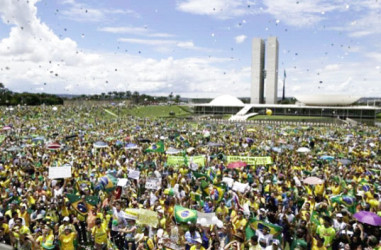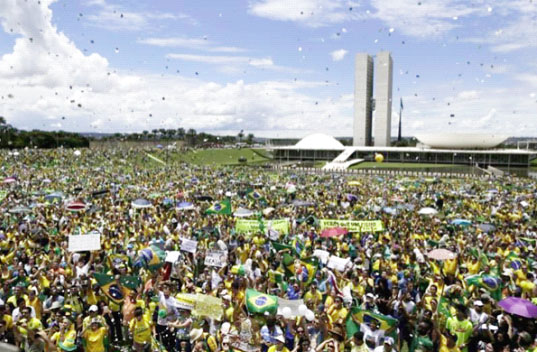SAO PAULO/BRASILIA, (Reuters) – Hundreds of thousands of Brazilians flooded the streets yesterday in the biggest ever protests calling for President Dilma Rousseff’s removal, reflecting rising popular anger that could encourage Congress to impeach the leftist leader.

The demonstrations were the latest in a wave of anti-government rallies that lost momentum late last year but have regained strength as a sweeping corruption investigation nears Rousseff’s inner circle.
From the Amazon jungle city of Manaus to the business hub of Sao Paulo and the capital Brasilia, protesters marched in a nationwide call for Rousseff to step down, raising pressure on lawmakers to back ongoing impeachment proceedings against her that just a few weeks ago appeared to be doomed.
Police estimates from more than 150 cities compiled by news website G1 showed around 3 million Brazilians participated in the demonstrations. Some police estimates of previous protests have proved to be exaggerated.
Polling firm Datafolha estimated 500,000 demonstrators in Sao Paulo, the biggest rally in the city’s history and more than twice the size of a major protest a year ago. The military police put the figure at 1.4 million at the height of the demonstration.
Government sources contacted by Reuters acknowledged the demonstrations were bigger than anti-government rallies in March 2015, which gathered as many as 1 million people.
In the skyscraper-lined Avenue Paulista in Sao Paulo, a sea of protesters wearing Brazil’s yellow-and-green national colors chanted “Dilma out” and waved banners that read “Stop the corruption” while music blared from nearby trucks.
“The country is at a standstill and we are fighting to keep our company afloat,” said small business owner Monica Giana Micheletti, 49, at the Sao Paulo demonstration. “We have reached rock bottom.”
Many blame Rousseff for sinking the economy into its worst recession in at least 25 years. Opinion polls show that more than half of Brazilians favor the impeachment of the president, re-elected for a second four-year term in 2014.
Rousseff, who insists she will not quit, is the latest leftist leader in Latin America to face upheaval as a decade-long commodities boom that fueled breakneck growth and social spending comes to an abrupt end.
Ahead of the demonstrations, tensions were high after Sao Paulo state prosecutors requested on Thursday the arrest of Rousseff’s predecessor and political mentor, Luiz Inacio Lula da Silva, on money-laundering charges. A judge still has to decide on the request, which can be rejected.
As in previous protests, yesterday’s rallies were led by middle-class Brazilians angry over growing allegations of corruption in Rousseff’s administration. No violence was reported.
Poor Brazilians, who form the base of the ruling Workers’ Party support, have not turned out in great numbers in recent protests. But their support for Rousseff has faded as unemployment rises and inflation climbs.
“This government helped many people buy homes, cars and electronics, but we still don’t have health, education and basic sanitation,” said Paulo Santos, a waiter who stopped at the demonstration which packed the beach-front avenue in Rio de Janeiro before heading to work.
Many protesters voiced support for Sergio Moro, the judge overseeing the two-year-old investigation into a network of political kick-backs and bribes centered on state oil company Petrobras. Some held banners that read “We are all Moro” after the judge’s uncompromising tactics have been criticized by the government.

